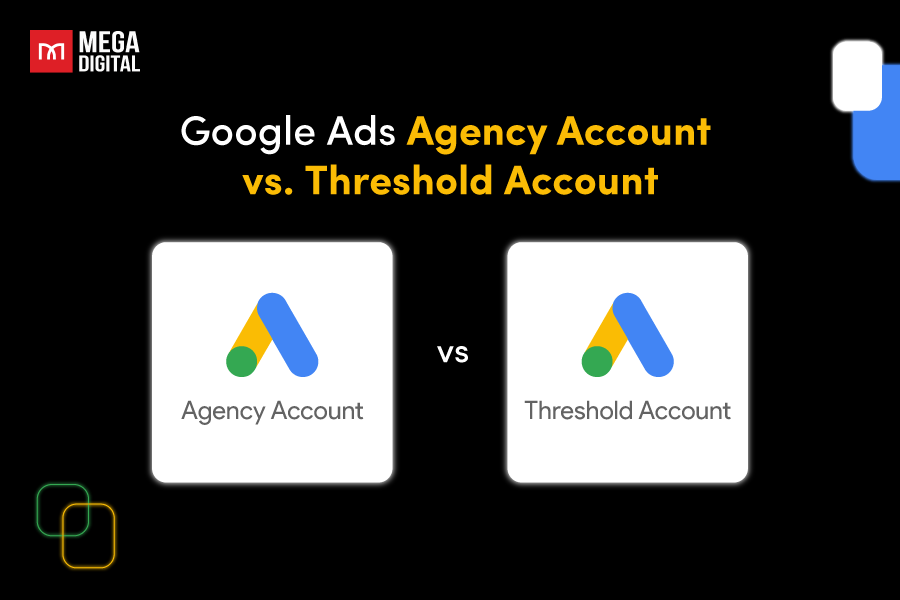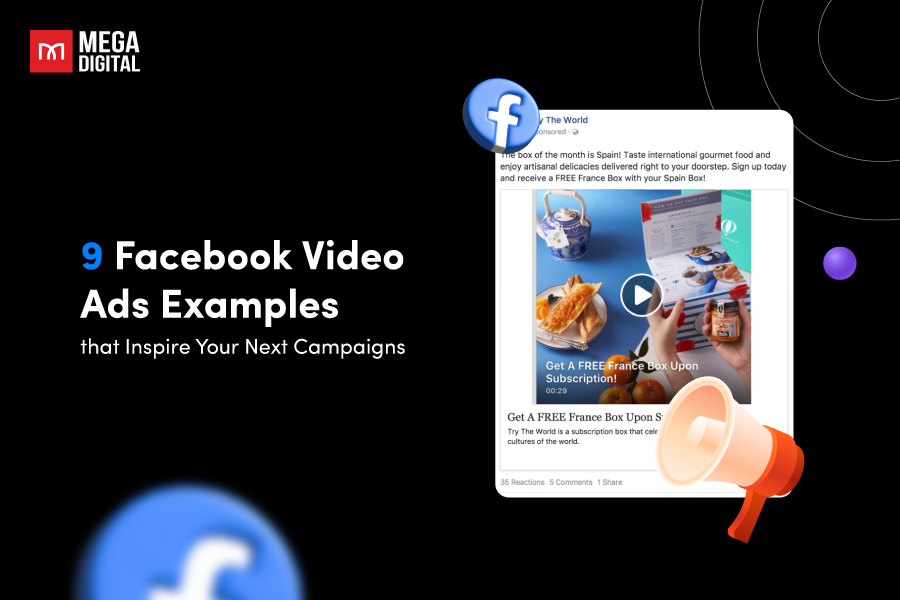You may have heard of the $10,000 per month Google Ad Grant that nonprofits receive from Google. But did you know that churches can also benefit from this grant? In this comprehensive guide, we’ll explore everything you need to know about Google Ad Grants for churches. From eligibility criteria to application steps and maximizing the value of the grant, I’ve got you covered.
Why Google Ad Grants for Churches?
As a digital marketing specialist familiar with the non-profit sector, I can tell you that Google Ad Grants offer a game-changing opportunity for churches. Here’s a breakdown of the key advantages:
Increased Visibility
Millions of people turn to Google every day to find information and resources. Google Ad Grants allows churches to place targeted ads on search results pages, ensuring their website shows up when people search for relevant terms like “churches near me”, “youth groups for teenagers”, or “Bible study classes”. This significantly boosts the church’s online presence and makes it more discoverable to potential visitors.
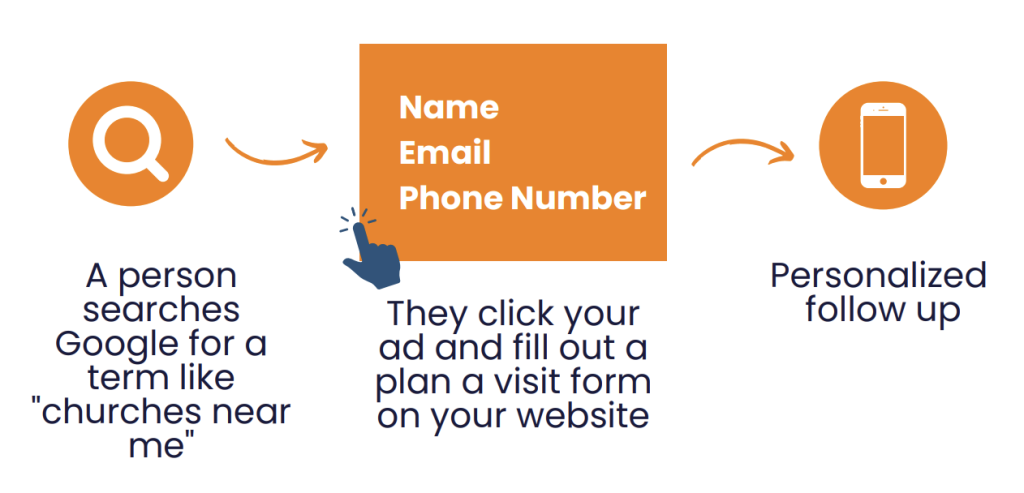
Targeted Outreach
Google Ads lets churches create campaigns with specific keywords and demographics in mind. For instance, a church with a strong youth ministry can design ads targeting searches for “Christian summer camps” or “volunteer opportunities for teens”, attracting a highly relevant audience. This focused approach maximizes the impact of the church’s advertising efforts.
Reaching New People
Many churches rely on traditional outreach methods that may not reach new demographics or people unfamiliar with the area. Google Ad Grants opens doors to reach a wider audience, including those actively searching for spiritual guidance, religious communities, or specific church programs. This can assist in attracting new members, volunteers, and donors.
Promoting Specific Events & Programs
Does your church have a special worship service, a charity drive, or a free community meal coming up? Google Ad Grants allows you to create targeted ads specifically for those events, ensuring they get noticed by interested people in the local community.
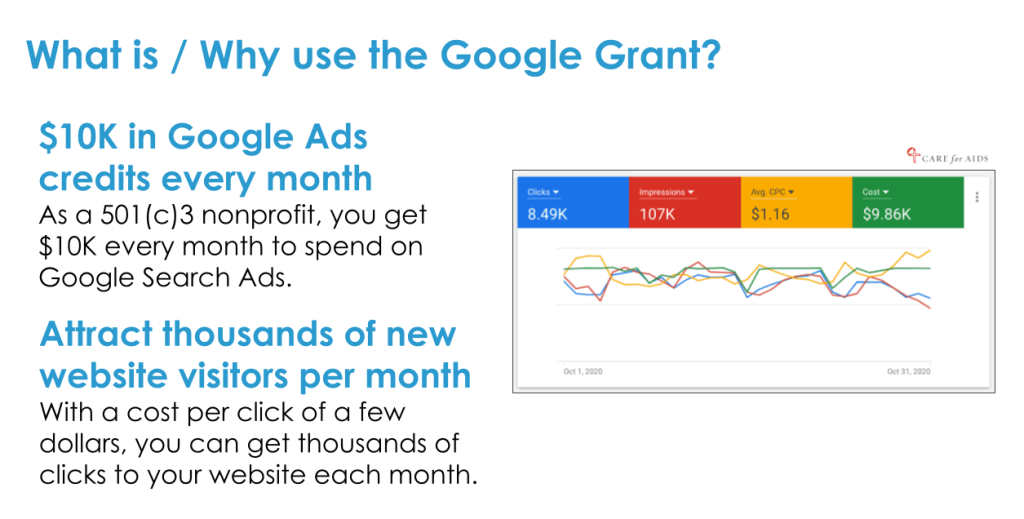
Which Ad Type is Recommended for Churches?
Churches can benefit from several Google Ad types depending on their specific goals. Here’ the most effective 4 options:
1. Search Network Ads
Ideal for reaching people actively searching for information related to your church.
Target relevant keywords like “church near me”, “[denomination] churches in [city]”, or “Bible study groups”.
Focus on clear calls to action, like “Visit our website” or “Learn more about worship services”.
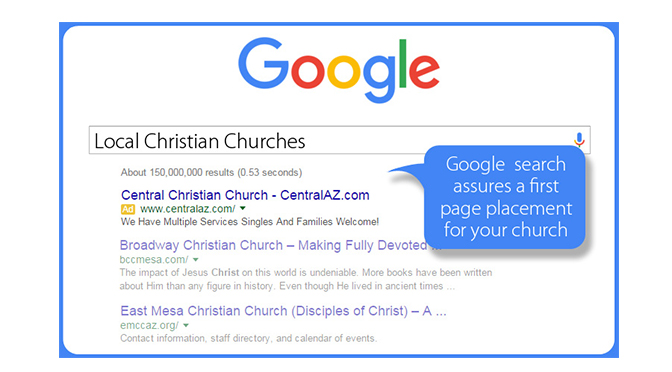
2. Local Search Ads
Perfect for increasing local visibility and attracting nearby residents.
Verify that your Google My Business profile is both comprehensive and optimized to appear in local search results..
Leverage location extensions in your ads to display your church address and phone number.
3. Event Ads
Promote upcoming events like Christmas services, youth retreats, or charity drives.
Target specific keywords related to the event theme (e.g., “Christmas Eve service” or “volunteer opportunities”).
Include clear dates, times, and location details in your ad copy.
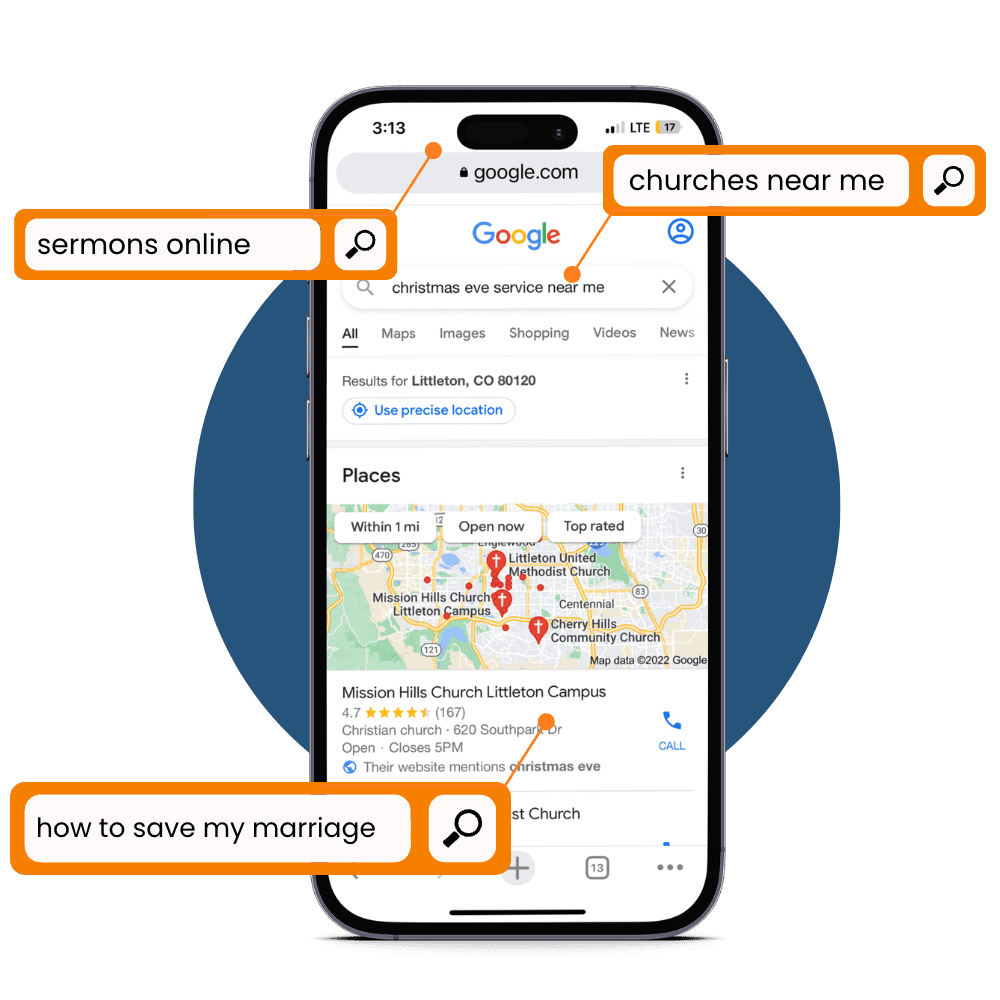
4. Display Network Ads
Reach a broader audience across various websites and platforms within the Google Display Network.
Use visually appealing banners or images to grab attention (avoid relying solely on text).
Target demographics and interests relevant to your church’s message (e.g., families, young adults).
Here are some additional tips for churches choosing Google Ad types:
- Start with a clear campaign goal: Are you aiming to increase website traffic, promote an event, or attract new members? Knowing your goal will guide your ad selection.
- Focus on local targeting: Unless your church has a wider online ministry focus, prioritize targeting your local community for maximum impact.
- Test and refine: Don’t be afraid to experiment with different ad types, keywords, and targeting options. Analyze your results and adjust your campaigns to optimize performance.
So those were the 4 types of Google Ads for churches that you should consider running. By using a combination of these ad types, you can promote your church services, events, and community outreach programs to a wider audience and attract more visitors.
Requirements for Churches to be Eligible for Google Ads Grants
Here are the main requirements for churches to be eligible for Google Ad Grants:
Registered Charitable Organization
This is the foundation for eligibility. Your church must be a recognized charitable organization within your country. The specific designation will vary depending on your location.
In the United States, this typically means having a 501(c)(3) designation from the Internal Revenue Service (IRS).
This designation signifies that your church is a non-profit organization operating exclusively for religious, educational, charitable, or scientific purposes.
In other countries, there might be similar designations for charitable organizations. Be sure to research the certain requirements in your region.

Accept the Additional Terms of Service for Google for Nonprofits
These terms outline the specific responsibilities and expectations for organizations participating in Google for Nonprofits programs. This includes responsible use of Google products and services, adhering to community guidelines, and maintaining a positive user experience. Familiarizing yourself with these terms ensures a smooth application process and responsible participation in the program.
Secure, Compliant Website that Follows the Policy
Google requires your church to have a website that meets specific criteria. Here’s a closer look:
- Secure Website: This means your website uses HTTPS encryption, protecting user data and information. Most website hosting providers offer options to enable HTTPS.
- Functioning Website: The website should be accessible and user-friendly. Ensure it loads properly, displays content correctly, and provides a positive experience for visitors who click on your ads.
- Compliant Website Policy: Google has website policies that ensure a positive user experience. This might involve avoiding misleading or deceptive content, complying with copyright laws, and respecting user privacy. Reviewing and adhering to these policies demonstrates your church’s commitment to responsible online presence.
Meeting All Other Program Policies
Beyond the core requirements, Google has additional program policies for Google Ad Grants specifically. These policies might cover responsible ad practices, campaign management guidelines, and budget spending. Familiarizing yourself with these policies ensures your church gets approved and continues to benefit from the program in the long run.
How Can Churches Apply for Google Ad Grants?
Let’s see how to get started with Google Ad Grants for your church:
Step 1: Obtain the Google Ad Grant
If your organization is a nonprofit, you qualify.
The application process is free and typically takes about 14 days for approval.
The grant does not expire. You can advertise on a wide range of search terms.
Here’s the process: Request a Google for Nonprofits account. After approval, sign in and complete the Google Ad Grant application. Once your application is approved, you’re all set!
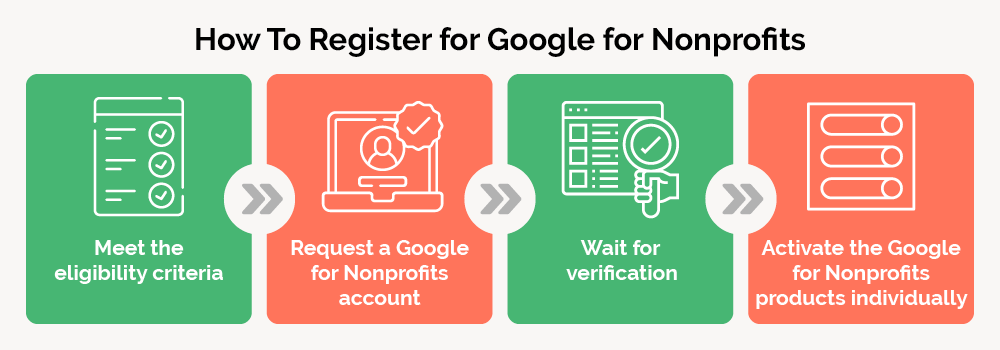
>>> More detailed steps here: Google Grants for Nonprofits: How to Advertise at 0 Cost
Step 2: Set up ads
You have $10,000 per month to use for your church, but you require a strategic approach to employ it effectively.
Begin with 2 basic “Find-A-Church” campaigns.
These campaigns aim to reach individuals in your local area who are actively searching for a church. To create an ad, you’ll require:
- Targeted keywords
- Compelling headlines & descriptions for your ads
- A landing page URL
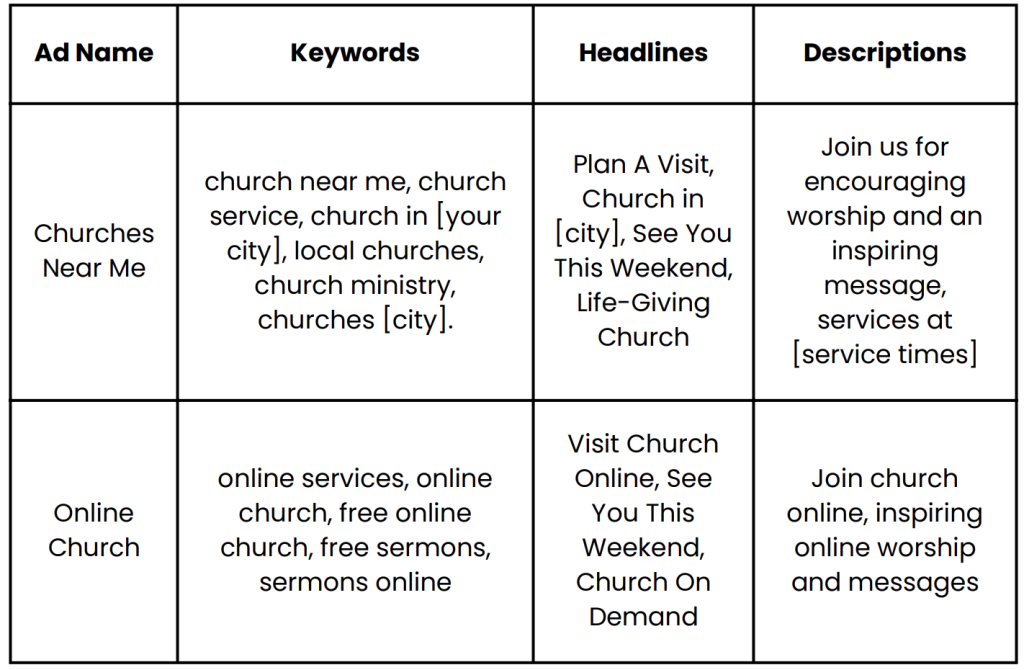
The Fìn-a-church campaign targets the search terms individuals might use when seeking a church in their local area. Here are a few instances of the keywords used in the campaign:
- Local Church
- Christian Church
- Lutheran Church
- Nearby Church
- Non-denominational Church
- Contemporary Church
- Baptist Church
- United Methodist Church
- First Presbyterian Church
- Evangelical Church
- Episcopal Church
- Mega Church
- Catholic Church
Step 3: Create Additional Campaigns
To maximize your grant, you’ll need more than find-a-church campaigns. However, this is your best chance to attract new visitors. People search Google for answers, making it prime for engaging potential churchgoers. To boost visitor engagement, I provide 5 custom landing pages.
- Family Activities
- Scripture about Overcoming Fear
- Advice for Newlywed Couples
- Games for Kids
- Bible verses on marriage
You or a staff member can compose a brief article addressing these common search queries. Subsequently, set up an ad targeting those search terms and witness the increase in traffic.
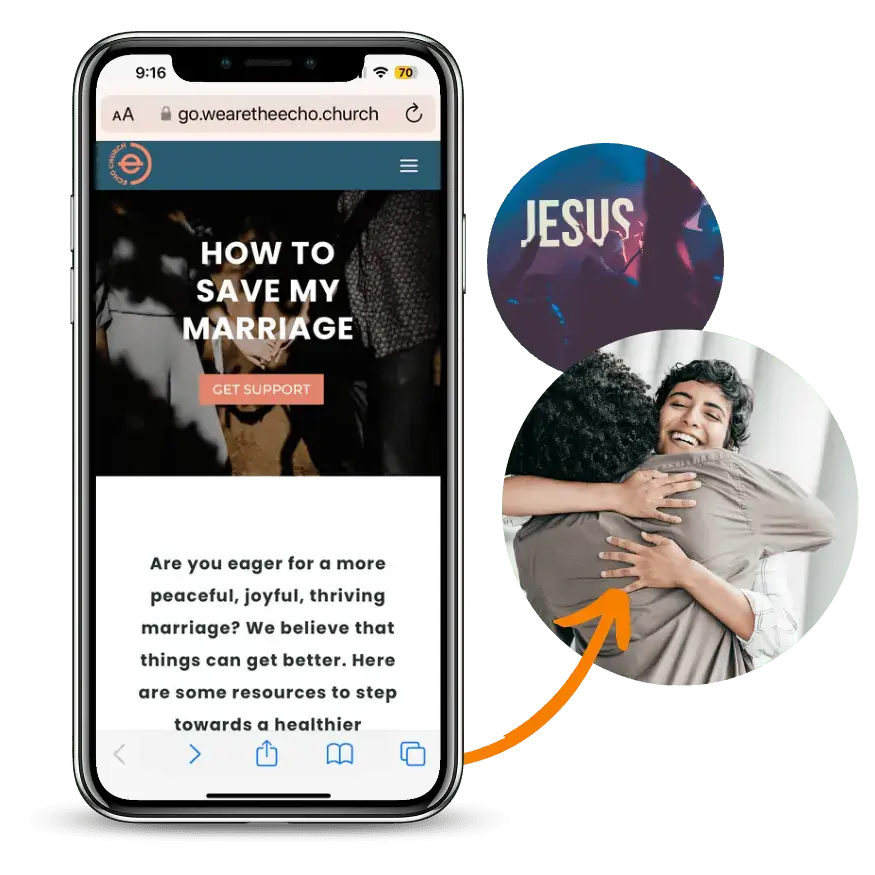
Churches can enhance their outreach efforts by incorporating additional ministry campaigns. These campaigns focus on the search terms individuals might use when seeking Christian Ministries in their locality.
- Men’s Ministry
- Women’s Ministry
- Children’s Ministry
- Marriage Ministry
- Sports Ministry
- Music Ministry
- Recovery Ministry
- Easter
- Christmas
Step 4: Organizing a Visit
Once your ads are up and running, and you’re attracting traffic, the next step is to encourage them to visit your church. Ensure that any page they land on from the ads includes a dedicated invitation to plan a visit. The invitation should include these:
- A 30-second video invitation featuring your pastor
- A concise plan-a-visit form, requesting basic details such as name, phone number, and email address
By using free traffic from Google Grants for churches, you’ve effectively increased the number of people planning visits to your church.
How Do I Optimize Google Ad Grants for Churches?
Churches can optimize their Google Ad Grants for maximum impact by focusing on several key strategies:
Define Your Goals
What do you want to achieve with your Google Ads campaign?
- Increase awareness of your church?
- Drive attendance at church services?
- Grow your online community?
Once you know your goals, you can tailor your campaign to achieve them.
Target the Right Audience
Google Ads allows you to target your ads to people who are searching for keywords related to churches in your area.
You can also target people by demographics, interests, and behaviors.
For example, you could target your ads to people who are searching for “churches near me” or “Christian services”.
Create Compelling Ads
Your ads should be clear, concise, and attention-grabbing.
Highlight what makes your church unique and why people should attend your services.
Use strong calls to action, such as “Visit our website to learn more” or “Join us for worship this Sunday”.
Define Budget Allocation
Since you have $10,000, consider a split between awareness and conversion campaigns. A possible allocation might be:
- 60% Conversion Campaign: Focused on driving attendance or online engagement (e.g., email list signups).
- 40% Awareness Campaign: Get your church’s name out to a broader audience in your area.

Case Study: St. Mary’s Hope Revived with Google Ads Grants
A case study showcasing the effectiveness of Google Ad Grants for churches here would serve as a compelling example of success.
Church
St. Mary’s Church, a historic church in a suburban area with a declining congregation.
Challenge
St. Mary’s faced a shrinking congregation, particularly among younger families. They struggled to connect with the local community and attract new members. Traditional advertising methods proved too expensive for their limited budget.
Solution
St. Mary’s applied for and received Google Ad Grants. They partnered with a volunteer marketing consultant to set up targeted campaigns.
- Keywords: Focused on relevant terms like “churches near me”, and “children’s ministry programs”.
- Location Targeting: Targeted ads to residents within a 5-mile radius of the church.
- Ad Types: Used a mix of Search Network Ads and Event Ads.
- Calls to Action: Encouraged users to “Visit our website” or “Learn more about youth groups”.
- Landing Pages: Directed users to specific website sections highlighting children’s programs, worship services, and community outreach initiatives.
Results
- Increased Website Traffic: Website visits jumped by 75% within 3 months of launching the campaign.
- Growth in New Families: The number of inquiries about children’s programs rose by 50%.
- Successful Events: Event Ads for a community Thanksgiving dinner attracted twice the expected number of attendees.
- Renewed Community Engagement: St. Mary’s experienced a renewed sense of connection with the local community.
Wrap up
Google Ad Grants for churches offer a powerful tool to reach their community, spread their message, and attract new members. With strategic planning, optimization, and adherence to Google’s policies, churches can effectively use this platform to further their mission and connect with people in meaningful ways.






